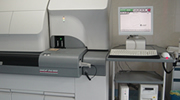【Warm Doctor Essay Solicitation】Director Jiang’s Small Thing
Hits: 3083 Time: 2020-07-01
“It’s said Director Jiang of your department is a very tender person”, this is the most frequent comments heard recently about Jiang Xinxin, Director of Nephrology Department at Zhejiang Hospital.
Director Jiang is young and promising, and is enjoying a high reputation on medical skills. However, he is as gentle as a jade on behaviors, is restrained, never boasting and be proud and insolent because of his talent. In the eyes of the patients, he is always amiable and friendly, without any official jargons.
“For example, a patient from Ningbo (we call him as Mr. Ning for the moment) is a long-term dialysis patient, with secondary hyperparathyroidism. His blood vessel conditions are very bad, both his necks and legs were once inserted with pipes, the superior vena cava also has stenosis, later the autostatic arteriovenous fistula was blocked again and he came to me finally.
We made an artificial vascular arteriovenous fistula for him, and the operation was very successful. When he was discharged from the hospital, I taught him how to listen to the murmur with the stethoscope every day. Once he felt the murmur weakened, he should contact me in time. I leave either my phone numbers or WeChat ID to the patients in case they do not reach me when they need it. Mr. Ning called me one night after 10 pm, and told me the murmur was almost not there. I asked him to come to hospital immediately, and contacted the emergency operating room for him after confirming the narrowing part with B-Ultrasound, and expanded the internal fistula for him in that evening.
If the internal fistula is the lifeline of dialysis patients, then Mr.Ning’s artificial vascular arteriovenous fistula was his only lifeline. If he came a little late and completely blocked, Mr.Ning may never have a chance of dialysis treatment, what’s waiting for him will only be despair. So no matter how late it was, I would operate on him as soon as possible.
Mr. Ning is not rich. Within the 15 years from chronic nephritis to uremia, he has spent most of this savings in treating his disease, and he even sells his house and moves into the basic living allowance house arranged by government. He insists on bringing some seafood products for us in order to show his thanks to our medical staff.
Director Jiang said there are many patients like him, and all their cases are vascular access problems difficult for local hospitals to solve, and they come to me under suggestions from other doctors or patients. Many doctors don’t wish to tell patients the personal contact number in case of being disturbed. However, Director Jiang doesn’t mind, and he has the habit of switching on his cell phone the whole night so that it will be more convenient for the patients to find him and seek for his assistance at any time.
It might be a small thing in Mr. Jiang’s mind. But maybe most of our doctors have chosen “it’s better to save trouble”. Maybe sometime the demands from the patients are rejected by “I’m busy now” or “wait for tomorrow”. It’s a job-related issue to us, but as for the patients it might be the distance from life to death.
Written by Lu Yunan from No.9 Branch of Clinical





